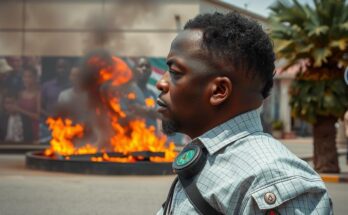Uruguay’s recent elections revealed a public rejection of authoritarian crime-fighting strategies, with voters choosing traditional parties advocating for balanced approaches. As violent crime rises due to organized crime growth, Uruguay emphasizes remedying crime through a democratic lens, maintaining individual rights while enhancing law enforcement measures. This reflects a notable divergence from nearby countries implementing extreme security policies, positioning Uruguay as a hopeful model for balancing security and democracy.
Uruguay, historically known for its stable democracy and low crime rates, is facing rising violent crime similar to trends across Latin America. Despite the alarming increase in violence, the recent presidential election in which authoritarian approaches to crime were largely rejected demonstrates a significant political shift. Politicians like Guido Manini Ríos of the Cabildo Abierto party, who campaigned on strict security measures, failed to gain traction, securing less than three percent of the vote, compared to his previous larger share five years ago. The election results indicate a strong preference among voters for traditional parties that promote rational crime-fighting measures rather than radical, militarized tactics. The resurgence of crime in Uruguay has been attributed to organized crime syndicates operating in the region, exacerbated by the country’s involvement in global drug trafficking networks. The murder rate has fluctuated significantly, peaking between 2011 and 2018 before experiencing a decline and then another rise. In this context, strategies based on human rights and civil liberties rather than militarization have gained favor, as evidenced by the general public’s rejection of policies like nighttime police raids. This electoral outcome serves as a hopeful sign for Uruguay and a critical lesson for other Latin America’s democracies grappling with crime. While other nations, such as El Salvador, have opted for heavy-handed measures leading to accusations of human rights violations, Uruguay’s approach has emphasized robust democratic institutions and intelligence-driven law enforcement. Over the last decade, it has strengthened its legislation against money laundering, legalized marijuana to combat criminal monopolies, and enhanced police training and intelligence operations. The recent election reaffirmed the public’s support for established political movements that prioritize a balance between security and civil liberties, rejecting the overt authoritarianism seen in various neighboring countries. Candidates from traditional parties proposed comprehensive reforms without abandoning the principles of rule of law, ensuring that democratic governance remains intact. As crime rises in the region, the international community may look to Uruguay’s model as an alternative framework that prioritizes democratic values while effectively addressing public safety concerns.
As violent crime continues to rise in Latin America, with countries facing increasing public demand for security, Uruguay stands out by successfully cultivating a political environment that resists authoritarian measures. Historical context plays a significant role; the memory of the military dictatorship from 1973 to 1985 influences a general skepticism toward heavy-handed policing. Moreover, Uruguay’s traditional political parties have effectively emphasized their commitment to securing safety without infringing upon citizens’ rights, distinguishing their platform from radical proposals gaining traction in neighboring countries. This paradigm shift in political attitude during elections reveals the resilience of democratic norms even in the face of significant security challenges, illustrating the potential for middle-ground solutions in addressing crime.
Uruguay’s recent electoral outcome conveys a powerful message regarding the rejection of authoritarian crime-fighting measures in favor of restoring faith in traditional democratic governance. The successful strategies employed to combat crime without compromising civil liberties serve as a model for both regional and global communities grappling with similar issues. In light of growing public anxiety over personal security, the Uruguayan example suggests that a commitment to democratic principles can coexist with effective measures to ensure safety, presenting an encouraging approach to the challenges faced in the broader context of Latin America.
Original Source: foreignpolicy.com




